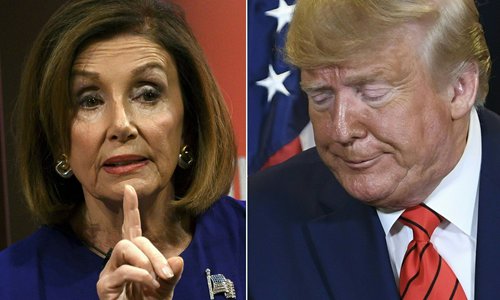HOME >> OPINION
US political chaos will damage global confidence
By Shi Tian Source:Global Times Published: 2019/9/25 20:18:41

Photo: VCG
Political chaos in the US is escalating.
US House Speaker Nancy Pelosi announced Tuesday that the House of Representatives will initiate a formal impeachment inquiry against President Donald Trump. Trump's phone call with Ukrainian President Volodymyr Zelensky in July was accused of asking for actions "which would benefit him [Trump] politically."
The speaker's statement gained extensive attention across the world, including from China.
Why is political chaos in Washington always in the limelight? Why is China concerned about the political events of a country on the other side of the Pacific Ocean?
The answer is simple: Chaos in the US, a major global power, may affect other countries.
Although there is no lack of contradictions and conflicts between China and the US, their connections are inseparable. In particular in the economic and trade fields, the US was the second-largest trading partner, largest export destination and sixth-largest import source of China in 2018.
Meanwhile, as the US-launched trade war against China is still underway, several trade talks await the two sides.
Trump has been deeply mired in allegations of Russian interference in the 2016 US elections since he assumed office. US politics has been filled with various investigations and reports over the past two and a half years. Personnel changes are also commonplace. Take the national security adviser. Robert O'Brien is the fourth official taking the position in the Trump administration.
The trade war intrinsically contains uncertainty. Now, the situation is getting worse. With a formal impeachment inquiry into Trump, it will be even harder for Beijing to gauge where Washington's policies are headed and how China should respond.
Some observers believe that Trump might be more eager to conclude a deal with China in an attempt to shift domestic pressure. Even if such an impact does not show up immediately, uncertainty in China will be obvious.
In addition to the trade war, the US political situation may touch multiple aspects. For instance, both China and the US shoulder responsibilities in major international issues, such as the Korean Peninsula issue and the Iran nuclear issue. Could a chaotic US government carry out effective discussions on these issues? Will it be able to ensure the consistency of its policies? It should be of great concern to China and the world.
Beijing cannot tell the future of Washington's political situation, nor will it interfere in other country's internal affairs. But we need to remind the US that frequent chaos in politics has led to a decline in US trust in China and the world.
If Washington continues to focus on political struggles rather than solving practical problems, if political chaos becomes normal, it may lose the attention and confidence of the world.
Posted in: OBSERVER